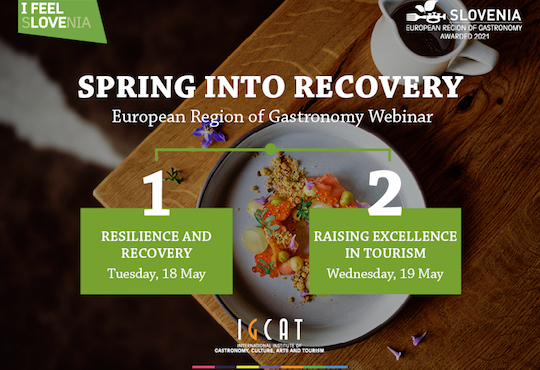IGCAT experts and stakeholders in food, culture, wellness, nature and many other sectors from over 30 countries around the world took part in the webinar Spring into Recovery: resilience, recovery and raising excellence in tourism, held on 18-19 May 2021.
Organised by IGCAT and hosted by the Slovenian Tourism Board, in the framework of Slovenia, European Region of Gastronomy awarded 2021, the event explored challenges and opportunities arising from the Covid-19 crisis to build back stronger, better and more sustainable travel, tourism, hospitality and cultural sectors across Europe.
By facilitating cross-sectoral dialogue, the webinar invited good practises from awarded, candidate and potential European Regions of Gastronomy on the implementation of programmes for recovery.
Each day started with a general session presenting views from main speakers, followed by smaller key group discussions involving more contributors.
On 18 May, the webinar focused on the theme of Recovery and Resilience and included interventions by Maja Pak, M. Sc., Director of the Slovenian Tourism Board; Iulia Niculica, Funding, Procurement and Development Manager, European Travel Commission and Secretariat, European Tourism Manifesto; Patrick Torrent, Executive Director of the Catalan Tourist Board and President of NECStouR; Barbara Zmrzlikar, Head of Research, Development, Innovation and EU Projects Department, Slovenian Tourist Board; and Heidi Lazani, Communications Specialist and former Head of the Executive Committee of South Aegean, European Region of Gastronomy awarded 2019.
The smaller breakout sessions hosted short presentations of good practices by various contributors, followed by group discussion with questions and answers. Each of the breakout sessions focused on a different topic, namely: Recovery and resilience in the tourism sector; Sustainable gastronomy and green labelling; Sustaining tourism on Europe’s Islands – the challenges; and Involving stakeholders to attract visitors.
Tanja Angleitner Sagadin, Director of the Vocational College for Catering and Tourism of Maribor, opened the second part of the webinar on 19 May, which explored the theme Raising Excellence in Tourism with main speakers: Stefano Dominioni, Executive Secretary of the Enlarged Partial Agreement on Cultural Routes – Council of Europe and Director of the European Institute of Cultural Routes; Roberta Garibaldi, President of the Italian Association of Gastronomy Tourism and former Scientific Director of East Lombardy, European Region of Gastronomy 2017; Diana Hounslow, Director of the Tourism Development and Reservation Agency of Pas-de-Calais and Ambassador of Hauts-de-France, European Region of Gastronomy candidate 2023; and Morana Polovič, M.Sc., Project Manager at the Slovenian Tourist Board.
During the breakout sessions, contributors had the chance to exchange views on further topics such as: Educating in order to promote sustainability; Building excellent visitor experiences and food/wine routes; Research and discovery into visitor needs; and Agrofood and innovation contributing to a region’s identity.
“Our aim was to provide a space to dream the world we would like to create; exchange ideas across different sectors to find new solutions to our current challenges; learn and deepen our knowledge-sharing possibilities as well as, support one another as leaders in our fields that are taking steps to ensure positive change” commented Dr. Diane Dodd, President of IGCAT and Chair of the webinar.
The rich array of knowledges and experiences exchanged at the Spring into Recovery event shared a common vision on the need to rely on cooperation as a main means to recover from the current crisis. Creating connections between and within destinations, encouraging dialogue across sectors and stakeholders, and supporting creativity and innovation will be the way towards a successful and sustainable post-Covid restart. An agenda that the European Regions of Gastronomy Platform has been pushing for the last five years.
The Spring into Recovery webinar coincided with the 22nd European Region of Gastronomy Platform Meeting and the 8th Annual IGCAT Experts Meeting.
About the European and World Regions of Gastronomy
Candidate and awarded European and World Regions of Gastronomy, guided by IGCAT, are working together to strengthen food security through the celebration of distinctive food cultures; create employment by stimulating creativity and gastronomic innovation; nourish children and adults through culinary and cultural education; drive environmental sustainability in tourism, hospitality and agricultural sectors; support balance and sustainable tourism practices; highlight and support expertise from within rural and urban communities, creating connections and sharing good practises; and contribute to community health and well-being.
About IGCAT
IGCAT aims to empower local communities by raising awareness of the importance to protect and promote distinct regional food, culture, arts and natural assets as part of sustainable and balanced tourism and development strategies. This is essential to safeguard our planet, health, wellness and local economies.
IGCAT is a non-profit institute established in 2012, working with regional stakeholder consortiums in the fields of gastronomy, culture, arts and tourism. It counts on the expertise of a worldwide network of experts and works in partnership with specialised intergovernmental organisations.
IGCAT founded the European and the World Region of Gastronomy Award and is the official secretariat for the European and World Regions of Gastronomy Platform. Furthermore, the Institute has developed the European Young Chef Award, the European Food Gift Challenge, the Top Visitor Experience and the Food Film Menu.
20 May 2021
